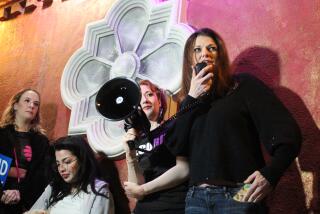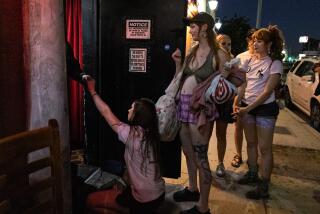Duarte Club Celebrates Court Ruling by Inducting 2 More Women Members : EX-ROTARY RIFT
- Share via
The little Rotary Club that shook the world with its feminist stand eight years ago had its own distinctive way last week of celebrating a favorable court ruling.
Meeting Wednesday as usual in the City of Hope Medical Center cafeteria, 16 regulars of what is now known as the Duarte Ex-Rotary Club conducted business as usual, reminisced and inducted two new members--both women.
That seemed fitting since it was the first meeting after a California appellate court on March 17 ordered the club reinstated to Rotary International, which had kicked it out in 1978 for admitting women members.
Although the all-male international service organization plans to appeal the decision to the California Supreme Court, members of the Duarte club savored the spotlight once again.
Membership Is Now 22
In marking an event that could have worldwide significance for more than 900,000 Rotarians in 154 countries, the Duarte regulars noted that their membership of 22 now includes 10 women.
They continued doing what they always do; they voted financial assistance for a school event, donated their services to a marathon, and considered requests for still more money and services.
And they welcomed Bernadine Ohanian, principal of Valley View School, and Donna Georgino, deputy director of parks and recreation in Duarte, into a club that claims to do more for Duarte than any other service organization.
Both beaming that their induction coincided with the club’s court victory, the new members said they wanted to join Ex-Rotary “because of what it does for Duarte.”
Subdued as it was, the meeting was memorable for Mary Lou Elliott, the only one remaining of the original three female members for whom Duarte Ex-Rotary sacrificed its international affiliation.
“I was invited to join by men,” she recalled. After the club received orders to get rid of the women, Elliott, principal of Andres Duarte Elementary School, said members “took two secret ballots and both times voted unanimously to keep the women. I was asked not to leave.”
As a result, Elliott said, “there’s never been any doubt that we (women) have been a lot of help to the club, and it has always been worth our time” to belong.
Richard Key, who was president in 1978 when the club attracted worldwide attention for its feminist stand, recalled that Ex-Rotary meetings became media events early in 1978.
“Once when we met in a restaurant the TV equipment blew all the fuses,” Key said. “I’d start getting phone calls at 3 a.m. and they wouldn’t stop all day. We got letters and calls from as far away as Australia and New Jersey. We even got support from clubs in South America, and that was a surprise.”
In addition, he said, the club got so many offers for free services from attorneys that it never has had to pay any legal fees. The secretary of another club, who never revealed his identity, sent the small, monthly fee he was paid for his club work, Key said.
The club battle began innocently enough in the mid-1970s when the Rotarians observed that, with their membership down to eight, they had little chance of surviving as a club. A logical recourse, they reasoned, was to open their membership to women, who were making increasing contributions to Duarte’s business and professional life.
Aware of Violation
They were aware that they were violating Rotary International rules, Key said.
“What we were doing shook up a huge old institution, but we didn’t do it to create a stir,” Key said. “We did it to survive as a club. But once we got into it we found we had a bigger issue--it was human rights. We had a lot of nerve, but not much else.”
Even though the male members were relieved that the club was back on a sounder footing, the induction of Elliott, Donna Bogart and Rosemary Frietag in 1977 went unnoticed at first.
But when visiting Rotary dignitaries saw the women members at the Duarte club’s 25th anniversary celebration early in 1978, they notified the club that it must terminate the women’s membership or the club charter would be rescinded.
“We were ordered to turn in our charter and we still haven’t done so,” said Key, who was then superintendent of the Duarte Unified School District. He has since retired and now is on the school board.
Plea at Convention
Luke McJimpson, a 27-year member of the Duarte club and principal of Northview Middle School, was the club’s emissary to that year’s international convention in Tokyo, where he pleaded for the club’s reinstatement. Delegates voted 1,060 to 34 to remain all-male.
Key said that after every recourse failed, the club sued for reinstatement.
“We lost in Tokyo, but we won a big battle,” McJimpson said. “We had a problem that was now exposed to clubs all over the world.”
McJimpson claims that Duarte’s population growth to 19,749 resulted from the club’s action eight years ago, when the population was 15,750.
“We got pride and respect for enlightening the world,” he said. “People around the world know about Duarte, and the growing of this community today is a result of that.”
Suit Hinged on Dues
Don Anderson, now the Ex-Rotary president, said members sometimes regret not being able to exchange visits with other Rotary clubs. They are sorry, too, that local businesses refuse to pay dues for members in the Ex-Rotary Club, as many do for affiliated clubs.
The Duarte club claimed in its suit that exclusion of women violates state law, which prohibits discrimination by a “business establishment.” In 1983, Los Angeles Superior Court Judge Max F. Deutz ruled that Rotary is not a business and refused to order the Duarte club’s reinstatement.
Last week’s ruling by the 2nd District Court of Appeal reversed Deutz’s decision.
Spokesmen for Rotary International said they will appeal the case to the California Supreme Court and the U.S. Supreme Court, if necessary.
Ex-Rotarians agreed that they may still be a long way from reinstatement.
“I can’t guess what’s going to happen next,” Anderson said. “In any case, we’re here to stay.”
CHRONOLOGY OF CONTROVERSY
1977--Duarte Rotary Club admits first three women members: Mary Lou Elliott, Donna Bogart and Rosemary Frietag.
1978--Rotary International warns Duarte Rotary Club to terminate women’s membership. Duarte club refuses and Rotary International rescinds the club’s charter. Member Luke McJimpson loses appeal for reinstatement at Rotary International convention in Tokyo, where delegates vote 1,060 to 34 to keep Rotary all male. Duarte Rotary Club becomes the Ex-Rotary Club and files suit for reinstatement in Los Angeles Superior Court.
June, 1980--Rotary International’s Council on Legislation, which meets every three years, votes in Chicago to retain male-only membership.
June, 1982--Rotary International, at a convention in Dallas, votes to remove all “unacceptable” vestiges of racism, and bans use of race, color, creed or national origin to restrict membership, but retains ban on women.
February, 1983--Los Angeles Superior Court Judge Max F. Deutz sanctions male-only membership and refuses to reinstate Duarte club, ruling that Rotary is “not a business establishment.” The Ex-Rotary Club appeals decision.
February, 1986--Rotary International, meeting in Chicago, votes for the fifth time to refuse admission of women.
March, 1986--State appellate court reverses Deutz’s 1983 ruling and orders reinstatement of Duarte club. Rotary International announces plans for appeal; reinstatement will not be required until all avenues of appeal are exhausted.
March, 1986--Duarte Ex-Rotary Club meets and installs two more women members, for a total of 10.
More to Read
Sign up for Essential California
The most important California stories and recommendations in your inbox every morning.
You may occasionally receive promotional content from the Los Angeles Times.













